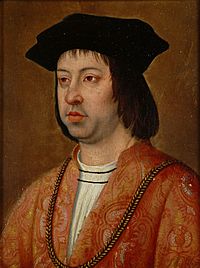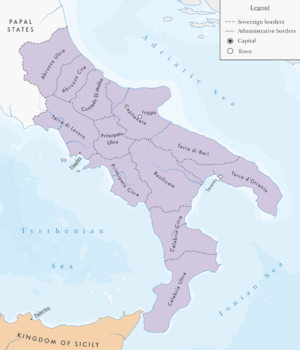Treaty of Granada (1500) facts for kids

Ferdinand II of Aragon
|
|
| Signed | 11 November 1500 |
|---|---|
| Location | Granada, Andalusia |
| Original signatories |
|
| Parties | |
| Languages | French |
The Treaty of Granada (1500) was a secret agreement signed on November 11, 1500. It was made between two powerful kings: Ferdinand II of Aragon from Spain and Louis XII of France. In this treaty, they secretly decided to divide up the Kingdom of Naples, a rich area in Southern Italy.
Contents
Why the Treaty Happened
Who Wanted Naples?
For many years, different royal families wanted to control the Kingdom of Naples. After Charles IV of Anjou died in 1481, the French royal family, called the Angevins, claimed Naples. This claim passed to Louis XI, and then to his son, Charles VIII of France.
Charles VIII easily took Naples in 1494 during the Italian War of 1494–1495. But when he went back to France, the king of Naples, Ferdinand II of Naples, quickly got his kingdom back. He had help from his distant relative, Ferdinand II of Aragon, who ruled the nearby Kingdom of Sicily. Ferdinand of Aragon saw French power in Southern Italy as a danger.
New Kings and New Plans
Charles VIII died in 1498. His claims to Naples and the Duchy of Milan then went to the new French king, Louis XII. Louis knew that France's plans in Italy were making other countries angry.
So, in 1498, Louis XII made peace with England. He also signed a treaty with Burgundy to confirm France's borders. In August, he signed the Treaty of Marcoussis with Ferdinand of Aragon. This treaty said they would be allies against common enemies, except the Pope.
After taking Milan in 1499, Louis XII went back to France. He started talking with Ferdinand of Aragon. Louis offered to split the Kingdom of Naples between them. Louis hoped this would avoid an expensive war. He also wanted Ferdinand's help against Frederick, who was Ferdinand's relative and ally.
The agreement was signed by Louis in Chambord on October 10. Ferdinand signed it in Granada on November 11. The treaty was kept secret. However, both kings told Pope Alexander VI, who approved the plan. The Pope even recognized Louis as the new king of Naples.
What the Treaty Said
The treaty divided the Kingdom of Naples into two parts. Louis XII of France got the northern areas. These included Abruzzo, Terra di Lavoro, Gaeta, and the city of Naples itself.
Ferdinand II of Aragon received the southern parts. These were Calabria, which was right next to Sicily, and Terra di Bari and Terra di Otranto, which are now part of Apulia.
Unassigned Areas and Disagreements
However, three areas were not clearly assigned: Basilicata, Principato, and Capitanate. Ferdinand argued that Basilicata and Principato belonged to Calabria. He also said Capitanate was part of Apulia. This would mean they were all his. The French disagreed.
The most important of these three was the Capitanate. This area was mostly used for raising sheep. The taxes from these sheep, called dogana delle pecore, were a main source of money for Naples.
Many people at the time, like Niccolò Machiavelli, criticized this agreement. Historians today also say it was a bad deal for Louis. Ferdinand had already agreed to stay neutral in 1499. Inviting Spain into Naples and not clearly dividing the land was a mistake for Louis.
What Happened Next
The Invasion of Naples
The French and Spanish armies quickly took over the Kingdom of Naples in the summer of 1501. The king of Naples, Frederick, at first thought the Spanish army was there to help him.
On July 24, the French army captured Capua. Louis decided to make an example of the town. Much of Capua was destroyed. Women were sold as slaves. Between 2,000 and 4,000 people died. These actions shocked people across Italy.
Resistance quickly ended. In August, Frederick surrendered Naples to the French. He was sent away to France, where he died in 1504.
The War Between Allies
While the Spanish were busy attacking Otranto, the French took control of the disputed areas. They refused to give them up. Attempts to solve the problem through talks failed. Many rich families in Naples owned land in both parts of the kingdom. They could not agree on a solution.
In late 1502, small fights between the French and Spanish grew into a full war. By the end of 1503, the French had been forced out of Naples again. Ferdinand of Aragon then took control of the entire kingdom.
See also
 In Spanish: Tratado de Granada (1500) para niños
In Spanish: Tratado de Granada (1500) para niños
 | William M. Jackson |
 | Juan E. Gilbert |
 | Neil deGrasse Tyson |


